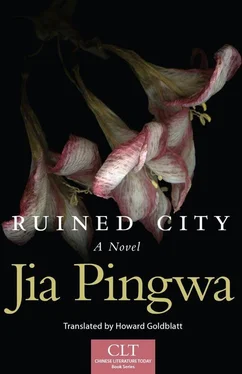“The buns taste all right, even though they don’t look so good,” she said. “It would be a shame to sell them to a pig farm, but how will the three of us finish them on our own? Why don’t we give them to friends and family in exchange for some goodwill? You have your mentors and friends, like Mr. Pang at the city paper and that Zhuang Zhidie.”
“You want me to give these worthless things to Mr. Zhuang?” he grumbled, but he was reminded of Ruan Zhifei, who, as he knew, was having a dormitory renovated for his band. He could sell the buns cheaply to the migrant workers at the job site. So he went off to see Ruan, but to his disappointment, the construction was finished and the workers had left. Feeling sorry for the man, Ruan called up some people he knew to see if the kitchens at their workplaces could buy some. At one point, he reached Niu Yueqing at work. She had been trying to find a way to cheer her husband up when the call came. Feeling genuinely sorry for Zhuang’s mentee, she said to Ruan, “All those people who dream about becoming a writer can’t live a normal life. Tell him to come see me this afternoon. I’m afraid our kitchen won’t buy the buns, but I’ll take them all. You don’t have to say what I’d do with them; just tell him our kitchen bought them.”
“You put me to shame with your compassion and generosity,” Ruan said.
“You don’t have to do anything for him, since he’s just an acquaintance. But Zhidie has been his mentor.”
“What has Zhidie been writing lately? He hardly leaves home, as if he’s on a spiritual quest. When will he consider stopping? Won’t you let him come enjoy the entertainment here? I have a favor to ask him.”
“Sure. Come over and invite him to the show. He’s been in a bad mood lately, and nothing pleases him at home. Some entertainment with an old friend might cheer him up.”
With the favor in mind, as well as Niu Yueqing’s request, Ruan picked up Zhuang that day to have lunch at the Tanghua Hotel, after which they returned to Ruan’s office on the ground floor of his house. It was a medium-sized three-story building whose second and third floors were rented by the band. Three rooms on the first floor had been turned into a large rehearsal studio, while the remaining rooms were used as offices and temporary guest rooms. After a few cups of Bashan’s Yunwu xianhao tea, Ruan asked Zhuang if he would be interested in watching a show that afternoon at a factory auditorium in the eastern suburb. One of the factory’s products had won second prize in Beijing, and the provincial government was hosting a celebration, for which Ruan’s band would perform. Zhuang asked if the program was the same as one he’d seen earlier, and decided not to go when Ruan said it was pretty much the same, just with different performers.
“I was hoping you wouldn’t want to go,” Ruan said, clapping his hands. “I have to be there with my band, but you can stay here. I’ll get you something good to drink and some cigarettes, and you can write an article for me.” He told Zhuang that the members of his original troupe were undergoing a professional evaluation. Ruan had taken unpaid leave to start his own band, but he had to undergo a professional evaluation with his troupe, since it could not be done with a band like his.
“With what you’re doing, why do you need the title?”
“Money is important and so is a professional title, because it gives you status. In our society these days, power and status can be turned into money. Take you, for example. Now that you’re famous, you can get published easily, and when that happens, you get paid. Am I right?”
“I get my status from my writing. What sort of professional title does a drama troupe provide?”
“I was once in charge of costumes. Just eliminating sweat stains on costumes is enough to write an article to get an advanced professional title. You know, when the performers sweat onstage, their costumes can’t be washed afterward. The common method is to spray alcohol on them, but you can still see the stains after they dry, plus wrinkles. My secret was to fold the costume after spraying alcohol and leave it in the trunk, where the alcohol slowly evaporates to clean off the sweat stain.”
“You need an article for that?” Zhuang laughed. “I can’t write that.”
“It’s not much, I know, but I’d earn a few hundred less if I didn’t know the secret. As far as I can tell, no one in the country who’s in charge of costumes knows this technique.”
“Why don’t you apply for a patent?”
“I’ll try performance if I can’t make it in costume,” Ruan said.
“What performance are you qualified for?”
“None, but I have unique tricks, passed down by my father before he died, though the troupe would not assign me a role so I could prove it. Take handling the fan, for instance. A fan onstage isn’t meant to cool you off; it has a specific purpose. It started out as a prop, then became formulaic before handling it became an artistic skill.”
“Are you going to tell me how each role has its style of handling the fan?” Zhuang asked. “Like the person in the martial arts role waves the fan in front of his belly, a scholar waves it around his chest, a monk over his sleeves, an old man by his beard, a blind man in front of his eyes, and a teacher on a stool, while a clown role stretches his arms with the fan to shoulder height.”
“So you know all that?”
“And those are your tricks?”
“All right, you know the fan. How about the hair? Do you know about ‘straightening,’ ‘tossing,’ ‘driving,’ ‘turning,’ ‘twisting,’ ‘spiraling,’ and ‘skyrocketing’?”
“No.”
“Of course you don’t. You don’t know handling the fangs, either. Actually, it isn’t just you, but no one in Xijing’s Qin drama knows. Why doesn’t anyone stage Zhong Kui Marries Off His Sister, Muddy River , or Underworld Judgment anymore? Because no one can master the skill of handling the fangs.”
Zhuang had never heard of handling the fangs; he didn’t even know what it meant. “You know how to do that?”
“Of course I do. Could you maybe write something about that?”
“How am I supposed to write about it if I’ve never seen it done? Even if you haven’t had a chance to perform it onstage, you can practice on me, and what I write might be helpful to your title assignment.”
Ruan was saying he would need pigs’ fangs but had no idea where to get them, when he smacked the back of his head before running to his bedroom on the third floor, where he got a handful of yellowed paper.
“Great, perfect. Here’s a description of different performances with fangs.”
Zhuang took it and saw that the text was accompanied by illustrations.
“My father wrote this years ago, private notes he never showed anyone but me. Why don’t you make some changes and turn it into an article? You have to help me this time. You can stay here and take a nap now, then work on it in the afternoon. I’ll treat you to some snake gallbladder liquor tonight.”
“I can do that,” Zhuang said with a smile. “You’re quite a character in Xijing, but who knew that you’ve been involved in schemes like this.”
Ruan laughed. “You write for fame and posterity, but I’m not that ambitious. I’m a living ghost striving for something better; great if I make it, but all right if I don’t. If I dress, it’s a fur-lined coat; if not, I go naked.”
In the afternoon, Ruan led a group of stylish men and women to the performance while Zhuang sat down to rewrite the fang-handling techniques after a nap. He had agreed to the task as a distraction to forget his worries, but he got hooked after a careful reading of the worn pages, even learning a few things, like the three body parts required to handle the fangs — the tongue, lips, and cheeks. A performer has to master the skills of lifting, moving, and controlling. The fangs can be placed either together or side-by-side. The different types of motions include swirling the fangs around in the mouth with the tongue; pointing the fangs up toward the eyes; moving only one set of fangs; making both sets protrude from the mouth; bringing the sets together; separating the sets; moving the sets to the corners of the mouth; pointing the sets down; and pointing the fangs down and moving them back and forth.
Читать дальше


![Matthew Vincent - [you] Ruined It for Everyone!](/books/216429/matthew-vincent-you-ruined-it-for-everyone-thumb.webp)









